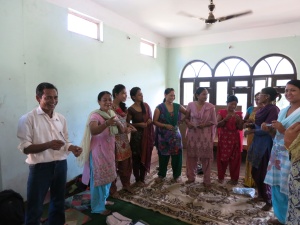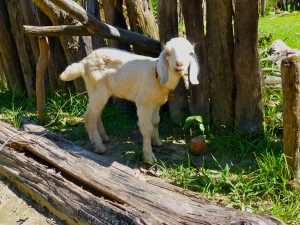Tags
community empowerment, conflict, Dang, development, fieldwork, Nepal, peace, Travel, Victim Assistance
Sweating, muddy, but in awe of my surroundings, I dunk my foot in a rice paddy with the vain hope the water will be cool. It’s not, with the sun beating down at 38 C, but at least the top layer of mud comes lose from my skin. We have traveled here by jeep, then by wooden boat to cross the river, and are now making our way shoes-in-hand through the muddy maze of rice fields that separate us from Rajpur village. The lush green and serenity of this place are a welcome break from the polluted concrete of Kathmandu. Savoring a rare breath of fresh air, I trudge on.
A recent development grad, this is the first time I have ever been this remote, this far removed from urban life, this lost in my surroundings. Rice paddies stretch in every direction, stopped only by the mountains that engulf the valley, glowing with an impossible blue that deepens with each range. We have been trekking with mud in our toes for well over an hour, slowly picking our way past women planting rice seedlings and men guiding herds of cattle through the muck. As we walk, my colleague teaches me the Nepali words for buffalo – rango for males and bhaisi for females – as well as helo mato – “watery mud.” Rightly so.
Today is our fourth day in Dang district, in the mid-west of Nepal’s Terai region, where NCBL is conducting trainings for a goats livelihood program in five conflict-affected villages. Here, poverty remains one of the most visible and destructive scars of war. The 10-year conflict in Nepal claimed not only individual victims, but also impacted entire communities who lost farmable land and agricultural labourers. NCBL has partnered with a local livestock expert to establish goat farming cooperatives as a sustainable form of income generation. This week, 50 families are receiving skills training on goat shelters, nutrition and disease prevention. In September, NCBL (and, with any luck, yours truly!) will return to distribute the goats themselves.
The trip has been challenging, but not in the ways I expected it to be. I am happy to report I have made much improvement on drinking and eating “the Nepali way” – that is to say my suspended-air drinking and scoop-hand-flick eating skills. I am also working on my fashionable rice belly with a strict diet of two-a-day dal bhat, Nepal’s national dish of lentils and rice. In a moment of heat exhaustion last night, I did make the unfortunate mix-up between my tube of toothpaste and tube of mosquito repellant cream. My taste buds will never let me live it down. Oh, and our jeep got stuck for 3 hours on a washed out road. We had to call in the big guns to get out of that SNAFU:
Of course, I didn’t really expect creature comforts to be the most difficult part of this trip. Instead, I have been confronting a general feeling of outsider-ness and the accompanying thought-flurry on this thing called ‘development’ and the role of foreigners therein. After two months of comms, grant and report writing at NCBL’s main office, I have been eager to get out “into the field” and am thankful for the experiences I have had in Dang – from learning about agricultural lifestyles, to returning smiles and a broken Mero name Katie ho, Ma Canada bata aayako hu to the stunning, sari-clad women in our trainings. These experiences are rewarding in themselves, but I have also felt the full weight of my lack of local knowledge and Nepali language skills.
Maybe at two months in Nepal I am overdue for the disenchanted-development phase of culture shock, but the trip to Dang was a well-timed and humbling reminder of how little university can prepare you for fieldwork. A degree in development does not teach you who to trust as community partners, or how to empower and educate through local humour, or where to draw the impossible line between those-in-need and those not-quite-needy-enough. The presumption that a fancy masters from a Western school will teach you more about ‘development’ than the knowledge of local practitioners would be comical if it wasn’t so arrogant… and so common.
Seeing how much value my Nepali colleagues bring to the field has only deepened my frustration for a backwards system where local NGOs scramble to squeeze their mandate into the square pegs of donor funding criteria. Of course, not all donors are created equal, and many are actively working to form partnerships that harness the experience and expertise of local NGOs. But on the whole, donors remain impatient and trend-focused. Even without the barrier of English as a second, third or fourth language, weaving the right combination of logic frames, needs-based justification, and emotive anecdotes is a delicate form of art. Not to mention the perception that many grants are dolled out based on personal relationships – call it corruption or by another name. Just this week, there have been stories of tens of staff being fired from an embassy in Kathmandu for taking kickbacks from grant applicants.
On a personal note, the trip has pushed me to re-think what I can offer as a foreigner working for NCBL. Back in the office this week, it’s time to move forward on some of the more long-term projects on my work plan. Stay tuned for updates!







Thanks for the post Katie, hope you are having a great time. If you are feeling frustrated about donor development programming that’s a good thing, it means you haven’t reached bleak cynicism yet!